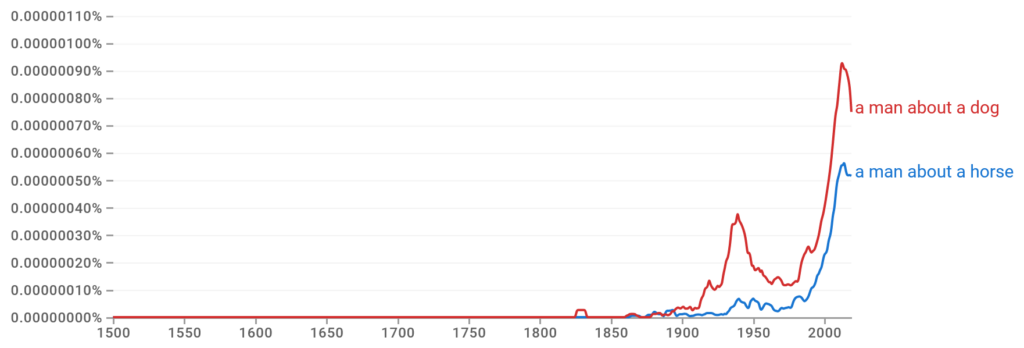To see a man about a horse means to politely excuse oneself to attend to a private or personal matter, often used as a vague excuse to leave a conversation or situation. It is usually related to having to use the restroom or to politely and humorously avoid answering a question.
Idiomatic expressions such as see a man about a horse are figurative phrases used in speech and writing that convey meanings beyond their literal interpretation, adding depth and nuance to communication. Understanding these expressions is crucial for effective language use and can enhance one’s English proficiency significantly.
In this comprehensive guide, I explore the intricacies of the idiom, covering its meaning, origin, and diverse use across various contexts. I also highlight its variations and related terms and offer practical tips for effective usage. Join me as we unravel the nuances of this intriguing phrase, equipping you with the insights to skillfully integrate it into your speech and writing.

What Does the Idiom See a Man about a Horse Mean?
The idiom see a man about a horse is a polite way to excuse oneself briefly from a group. While commonly used as a euphemism for using the restroom, it may also refer to purchasing alcohol.
This phrase is often used vaguely and lightheartedly to indicate the need to attend to a personal matter without explicitly stating its nature. While it can be interpreted in various contexts, its primary implication is typically to excuse oneself to use the restroom or address a personal need.
Variations of the Idiom
The idiom’s most common variation is see a man about a dog. They mean the same, but the version see a man about a dog was the original expression, with horse replacing dog soon afterward.
How Is See a Man about a Horse Commonly Used in Context?
The idiom see a man about a horse finds its way into various conversations and situations, often serving as a polite excuse or diversion. Below, we explore its diverse applications, offering insights into its usage, examples, and effective tips for incorporating it into everyday language.
What Are the Different Ways to Use See a Man about a Horse?
Consider the following examples of use, along with how you can incorporate the idiom into dialog:
- Evasive response: When someone asks an intrusive or personal question, you can use the idiom as an evasive response.
- Person A: “Where are you going?”
- Person B: “Oh, just need to see a man about a horse.”
- Excusing oneself: Use the idiom as a polite or lighthearted way to excuse yourself temporarily from a conversation or gathering.
- Person A: “Do you mind if we continue this discussion?”
- Person B: “Not at all, but I just need to see a man about a horse. I’ll be right back.”
- Humorous distraction: Employ the idiom to change the subject, inject humor, or diffuse tension in a conversation.
- Person A: “I can’t believe you made that mistake.”
- Person B: “Well, you know what they say, sometimes you just have to see a man about a horse.”
- Discrete excuse for using the restroom: Use the idiom as a lighthearted and humorous way to indicate the need to go to the restroom.
- Person A: “Where are you going?”
- Person B: “I’ll be right back; I just need to see a man about a horse.”
- Writing or storytelling: Incorporate the idiom in written works or storytelling to add a touch of humor or to create a playful atmosphere.
- “As the protagonist hurried out of the room, he muttered, ‘I must see a man about a horse, and quickly!'”
Where Can You Find Examples of See a Man about a Horse?
You can find examples of see a man about a horse in various literary works, movies, and everyday conversations.
Publications that share the idiom usually use it within lighthearted dialog or narrative, like these two examples:
My grandfather would join us after he been “to see a man about a dog.” (The Irish Times)
We’d be going along on the forest trail when all of a sudden John would veer off into the trees, saying, “I’m off to see a man about a horse.” (The Ventura County Reporter)
What Are Some Tips for Using See a Man about a Horse Effectively?
Remember, the key is to use the idiom lightheartedly, ensuring it adds humor or serves its purpose of evasiveness.
- Context and appropriateness: It is typically used in casual or informal conversations, and it may not be suitable for formal or professional settings.
- Tone and delivery: It is meant to be lighthearted and humorous, so use it with a playful tone to convey the intended effect.
- Familiarity: Some people may not be familiar with it, so consider whether they will understand the meaning or find it amusing.
- Evasive or humorous response: It can be a playful way to change the subject or avoid answering a question directly.
- Timing: Using it at the right moment can enhance its effectiveness and comedic effect.
- Practice moderation: Overusing it may diminish its impact and humor. Reserve it for appropriate moments to maintain its effectiveness.
What Is the Origin of the Idiom See a Man about a Horse?

The expression see a man about a dog was first used in the play The Flying Scud, written by Dion Boucicault in 1866:
“Excuse me Mr. Quail, I can’t stop; I’ve got to see a man about a dog.”
The phrase see a man about a horse came into use soon after as a variant.
A revival of the expression occurred in 1939 on an NBC Radio program, America’s Lost Play. At the time, it was said the expression was the play’s claim to fame.
How Did the Idiom Evolve Over Time?
Over time, the idiom has evolved to sometimes humorously suggest that the person may be stepping away to engage in another activity, such as purchasing alcohol. However, its most common usage remains as a polite and indirect way to excuse oneself temporarily from a social situation.
What Are Some Related Terms to See a Man about a Horse?
Synonyms are an excellent way to help determine how and where you should place idioms in a sentence. Take a look at these synonyms of see a man about horse to help you determine its use.

Synonyms
- Take a break
- Excuse myself
- Step out for a moment
- Attend to a pressing matter
- Go handle something
- Need to be elsewhere
- Have a quick errand
Antonyms
- Stay put
- Remain present
- Stay engaged
- Continue the conversation
- Stick around
- Remain attentive
- Stay on task
See a Man About a Horse: Test Your Knowledge!
Choose the correct answer.
What Have We Learned about See a Man about a Horse?
The idiom see a man about a horse is a versatile and humorous way to excuse oneself, evade a question, or inject levity into a conversation.
With its origin dating back to the early 20th century, this idiom has stood the test of time, continuing to be used in everyday conversations. The phrase is popular enough to be well recognized as a way to avoid conversation or explain your absence in a lighthearted way.
This article reviewed its origin and modern-day meaning, taught you how to incorporate it into your own speech and writing, and offered tips to help you use it correctly. You should be all set to use it in your material with confidence.
Explore more of our collection of idiomatic explanations to enhance your English language proficiency and refine your communication abilities.
Check out some others we covered:
